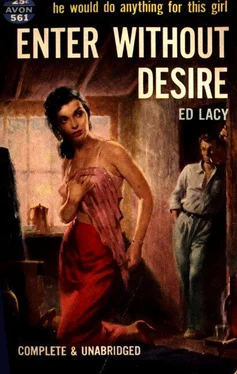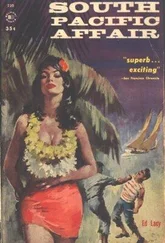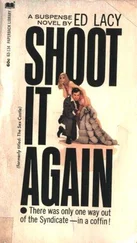Ed Lacy - Enter Without Desire
Здесь есть возможность читать онлайн «Ed Lacy - Enter Without Desire» весь текст электронной книги совершенно бесплатно (целиком полную версию без сокращений). В некоторых случаях можно слушать аудио, скачать через торрент в формате fb2 и присутствует краткое содержание. Жанр: Старинная литература, на русском языке. Описание произведения, (предисловие) а так же отзывы посетителей доступны на портале библиотеки ЛибКат.
- Название:Enter Without Desire
- Автор:
- Жанр:
- Год:неизвестен
- ISBN:нет данных
- Рейтинг книги:4 / 5. Голосов: 1
-
Избранное:Добавить в избранное
- Отзывы:
-
Ваша оценка:
- 80
- 1
- 2
- 3
- 4
- 5
Enter Without Desire: краткое содержание, описание и аннотация
Предлагаем к чтению аннотацию, описание, краткое содержание или предисловие (зависит от того, что написал сам автор книги «Enter Without Desire»). Если вы не нашли необходимую информацию о книге — напишите в комментариях, мы постараемся отыскать её.
Enter Without Desire — читать онлайн бесплатно полную книгу (весь текст) целиком
Ниже представлен текст книги, разбитый по страницам. Система сохранения места последней прочитанной страницы, позволяет с удобством читать онлайн бесплатно книгу «Enter Without Desire», без необходимости каждый раз заново искать на чём Вы остановились. Поставьте закладку, и сможете в любой момент перейти на страницу, на которой закончили чтение.
Интервал:
Закладка:
We stared at each other for a long time. His face was pale and his eyes puzzled. He asked, “What the hell is this? What you throw a gun on me for? Who the hell are you?”
CHAPTER THREE
ONE OF THE CORNY JOKES you heard in the army was: “You never had it so good.”
That was pretty true for me, I got more than my share of breaks in the army. At the start I remained at Fort Dix for nearly three months. Guys were being shipped out on all sides of me, but my name was never called. Our regiment, company, battalion, or whatever we were, was made up of a small permanent cadre of several enlisted men, all “old” army men, meaning they had been in six months or a year, and a Captain Drake, a dapper little man about thirty-five years old. His uniform was always sharply pressed, he walked with an inflated strut, spoke with a drawl, and happily was rarely seen. I was made a barracks orderly, meaning after morning inspection I had nothing to do for the rest of the day.
On week-ends I came in to New York and saw Mary Jane, and one day I walked into Kimball on Lexington Avenue and she made a fuss over my being in uniform and bought me a fine wrist-watch on the spot.
I was taking things easy, doing a lot of sketching of the various faces in camp, plenty of reading, and soaking up hours of sack time. For the first time in my life I had no worries about rent or food, and the army showed me the fallacy of this goosing finger of fate we call ambition. I mean, a joker hustles and wears the correct clothes and puts up a big front to impress his boss—and zowie, the army calls him and all that energy is wasted because now he's merely another buck-ass private under a non-com who happened to be called a few months before our joker-buddy. So he bucks like hell for stripes in the army, brown-noses everybody in sight, and maybe by the time the war is over, he has sergeant stripes and then—zowie, they discharge him and he's a nobody civilian again and has to start the apple polishing all over again. Now I don't mean a guy shouldn't try to get ahead—but not too hard, should make that his whole life. You push so much, you never get a chance to enjoy life, and one day you'll push yourself into the grave and they'll shovel dirt on your face and on your tombstone they'll chisel, Where Did It All Get You?
The trouble was, after a time I got restless at Dix. I dropped in to see Captain Drake, gave him a clumsy salute, asked if my records had been lost or something. He said, “Jameson, you're a Kentucky boy and ah'm from the South, too. Figured ah'd rather have you getting these soft jobs around here than any of these here Northern boys. Sick to my belly with talking to Jews and wops and micks. About a year or so, they'll throw mah can out of here and ah'll take you with me. All right with you, boy?”
“Yes, sir. Only—well there is a war on. I sort of feel useless here.”
“You got spunk, son. But ah let you go and sure as shooting you'll be shipped to the infantry. Know you don't want that. Boy, what were you doing in civilian life?”
It was a good thing I wasn't drunk on PX beer at the moment—one more “boy” and I might have socked his skinny jaw. I said, “I was an artist—advertising art.”
Drake was impressed, said, “See what I can do for you, Jameson.”
I cinched the deal by giving him a pen-and-ink drawing of himself. A week later I was sent out of Dix on a one-man shipping list, stationed at Lexington Avenue and 46th Street. I was part of a special-service outfit that made posters. We had a chicken officer who must have got a rake-off from the shoe polish companies. We had to march along crowded Lexington Avenue, trying to look like soldiers, and all the people staring at us as though we were. I felt more of a fraud than in Dix. It was very frustrating.
Also, I was seeing Mary Jane every night and I wanted to get away from her. Poor Mary was at least working in a defense plant in New Jersey and I didn't want to be a tin soldier. I casually mentioned to the first looey who was our CO. that I didn't think the war effort was really dependent upon whether we shined our damn shoes or not. Two days later I was back in Dix and out the same night on a troop train heading for Fort Benning, Georgia.
Infantry basic wasn't as rugged as football training and it felt fine to get into shape again. But one morning when they had us hitting the dirt—running and throwing ourselves on the ground—breaking the fall by digging the butt end of our rifles into the hard earth—I took a heavy fall and had a headache that scared hell out of me.
On sick call I told the doc about having had a concussion and they took X-rays and stuff. To my surprise I was soon on my way to an artillery outfit in Kansas where I worked at painting camouflage. It was interesting work and I learned a lot about blending colors. Most of the fellows were artists and I became pals with Sid Spears, who'd been studying sculpture when he got his greetings.
Sid was a tall, thin fellow with a sensitive Jewish face, but he'd been a college boxer and for some unknown reason his skinny frame packed a hell of a wallop. The two of us became a jerky goon squad; we made a good combination—Sid so thin and me so short. We'd get a little liquored up in some dive, start talking a lot of high sounding “art” talk—which was bait for characters who thought wearing a uniform made them rugged, entitled them to make snide cracks about us being “ball-bearing Wacs, charging over the top with fixed paint-brushes.”
It was stupid fun, Sid flooring guys with one punch and me tackling them if he didn't floor them, or throwing them against the walls.
Sid and I came to New York together on leave and had a good time at his place. I wasn't going to see my wife, but I felt like a bastard and finally spent my last two days with her.
After nearly two years in Kansas we were all shipped to Camp Patrick Henry in Newport News, Virginia, I called Mary J. and she bawled over the phone and then I was jammed on a Victory ship for a slow and pleasant crossing of the Atlantic, spent some weeks hangings around Oran in North Africa, sketching the Arabs and the ruined tanks. Then Sid and I and four other fellows were flown to London, and after D-Day, we followed the real soldiers into Paris, lived at a small hotel on Place Clichy, worked eight hours a day drawing maps, making scale topographic models of future battlegrounds.
Of course Paris was terrific and Sid had been there in 1935 and seemed to know a lot of people on the so-called Left Bank. He introduced me to a huge old man with a flowing white beard named Bonard. Bonard liked nothing better than to tell us about the old days of the Left Bank and the Montmartre—as he smoked our cigarettes and took our rations home. He was a sculptor and “home” was a large, dirty old barn on the outskirts of Paris which was also his studio. He had a few heads and small figures around, and I don't think he'd touched any clay in years, but I began fooling around with clay and right away I knew I'd found my medium—this was what I wanted to do. Sculpting was far more satisfactory, more creative than working with paints and brushes. When you made a statue of a woman, by God, there it was—nothing on flat canvas, but something you could touch and handle and feel proud of, as though you had almost created life.
I spent the war in Paris, working on maps during the day, visiting the famous old cafes at night with Bonard, as he talked about Saint-Gaudens, Rodin, Malvina Hoffman, Epstein, about Stein and Hemingway. I heard about the successes, the suicides, and the love affairs of the “old days.” I knew most of the time Bonard was merely repeating gossip, and I didn't believe him when he said he'd been a personal buddy of Gauguin, had in fact urged him to go to the South Seas. Bonard was a grand old liar but he did give me valuable lessons in the human anatomy, and when I slipped him a few cartons of cigarettes, he came up with some plaster and I began making casts of my fingers, my hand, my fist. The first time I tried it, I didn't know plaster grows hot as it hardens, and I screamed like a madman that I was losing my hand as Bonard roared with laughter. Under his instruction I even tried a few heads and one figure, was pleased when he said I had talent. Whenever I could get a jeep, the two of us would drive around examining the various statues with which Paris is studded, Bonard pointing out the good and bad techniques. I became very fond of the old man.
Читать дальшеИнтервал:
Закладка:
Похожие книги на «Enter Without Desire»
Представляем Вашему вниманию похожие книги на «Enter Without Desire» списком для выбора. Мы отобрали схожую по названию и смыслу литературу в надежде предоставить читателям больше вариантов отыскать новые, интересные, ещё непрочитанные произведения.
Обсуждение, отзывы о книге «Enter Without Desire» и просто собственные мнения читателей. Оставьте ваши комментарии, напишите, что Вы думаете о произведении, его смысле или главных героях. Укажите что конкретно понравилось, а что нет, и почему Вы так считаете.









